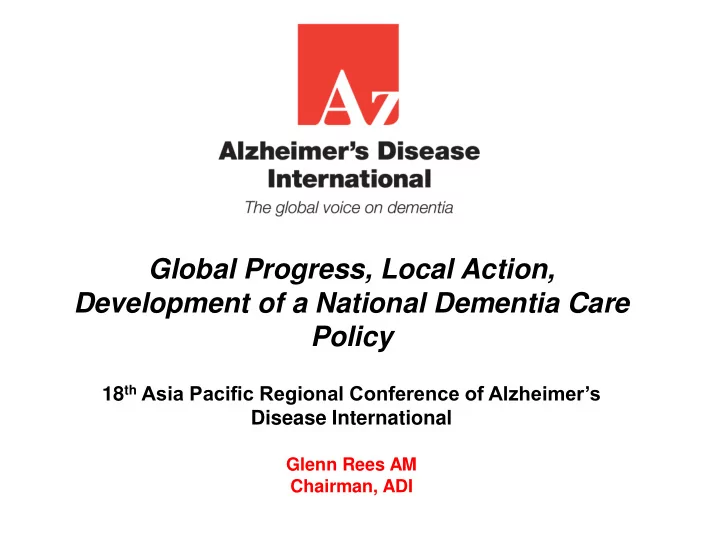

Global Progress, Local Action, Development of a National Dementia Care Policy 18 th Asia Pacific Regional Conference of Alzheimer’s Disease International Glenn Rees AM Chairman, ADI
Background • Attitudes to dementia are slowly changing • There is an increasing recognition of the need for global action • The idea of Dementia Friendly Communities could not have been contemplated in 2000
National Dementia Plans Countries with National Dementia Plans* www.alz.co.uk/alzheimer-plans *as of June 2015
National Dementia Plans • Plans don’t always mean action • Many low and middle income countries still have very low awareness of dementia • “Where can doctors refer people with dementia for support and care in the Philippines? ” • Revolution not evolution necessary to tackle dementia
The global prevalence of dementia www.worldalzreport2015.org
Victories • Alzheimer organisations around the world have attracted the attention of government with statistics and emotive language around epidemics • In the end, it is values and philosophy that are key to achieving change • Advocacy by people living with dementia and carers is critical to a greater awareness of dementia
Victories • Alzheimer associations should empower people with dementia and carers to be the drivers of change • Dementia Alliance International (DAI) • ADI and DAI in partnership • There has been a change in language that embraces dementia as a public health issue, preventable and a social as well as medical issue
Strategic approach • Australia was first country to acknowledge dementia as serious health issue in 2004 • $320 million committed to fund dementia initiative over 5 years • National Dementia Plans pre-condition for political awareness and future action
Strategic approach OECD’s Addressing Dementia • Overview of policies employed by member countries to tackle dementia • Identifies ten key policy objectives • All countries should have dementia plans suited to their needs
OECD the ten key objectives for dementia policy Prevention (out of scope) The risk of people developing dementia is Care coordination and the role of technology minimised 1 (chapter 6) Care is coordinated, The potential of First proactive and technology to symptoms delivered closer to transform dementia appear home care is realised 9 Diagnosis 10 (chapter 3) Dementia is diagnosed Progression of quickly once someone dementia becomes concerned Early dementia (chapter 4) Advanced dementia (chapter 5) End of life (chapter 5) about symptoms Living in the community and Greater need for formal care End of life care for people with 2 relying on informal care services and specialised dementia presents specific accommodation challenges Communities are People with Store People with safer for and more dementia live in safe dementia die with accepting of people and appropriate dignity in the place of with dementia environments their choosing 3 5 8 Those who wish Formal care to care for friends services are safe and relatives are and of a high quality supported 4 6 Health facilities recognise and effectively manage dementia patients 7
World Alzheimer Report 2015 • Awareness raising • Dementia friendly communities • Improve diagnosis • Support family carers • Long term community and residential care • Enhanced care for people with dementia in hospitals • Person centred care • Training of the workforce • Use of technology • End-of-life care with respect to dignity and personal wishes www.worldalzreport2015.org
Dementia Friendly Reducing stigma and social isolation • Dementia Friends pioneered in Japan • Transform people’s perceptions of dementia by creating Dementia Friends • People of all ages and cultures • Social actions www.alz.co.uk/publications
Timely diagnosis The experience of dementia can be traumatic for people who do not receive a timely diagnosis and support • 3 out of 4 people globally have never received a formal diagnosis • Timely diagnosis must be a focus for developing National Dementia Plans • Scotland has increased diagnosis rate to 60%
Timely diagnosis • A target must be set which can be increased over time and monitored by health authorities • 12 month post-diagnostic support guarantee • May reduce the fear of seeking a diagnosis because there is an assurance of support • Personal plan should utilise individual’s networks and community support
Support for family caregivers Staying for as long as possible in the community • Training for caregivers • Counselling and flexible community based home care services • Respite that is flexible and responds to the unique needs of the individual • Dementia care models should be community based and available to people at all stages
Acute care Across the world acute care systems are struggling • In the UK, a quarter of hospital beds are occupied by people living with dementia • Studies show people with dementia stay in hospital for twice as long as those without dementia • Twice as likely to experience falls, pressure ulcers, fractures etc. • Dementia Nurse Consultants in 13 NHS Boards in Scotland, joined by 500 Acute Care Champions
Conclusions We must promote policy discussion and formulate a global agenda for action • Awareness and dementia friendly communities • Timely diagnosis and post diagnostic support • Family carer support, home care and respite services • Acute care
Follow ADI on Twitter @AlzDisInt @glenn_rees Like us on Facebook /alzheimersdiseaseinternational Visit our website www.alz.co.uk
Recommend
More recommend